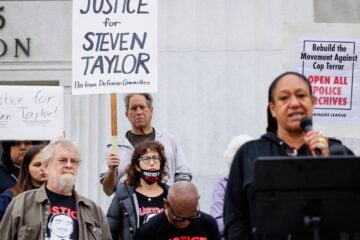Giving by texting: So far, you’d LOL at net proceeds
Americans’ response to the post-earthquake crisis in Haiti demonstrated the power of technology-enabled charity, but public broadcasters who have tried raising funds from mobile givers say it’s been a money-losing proposition so far.
 A handful of public stations have tried various ways of soliciting donations by text messaging. Philadelphia’s WXPN asked attendees of last summer’s XPoNential Music Festival to chip in $5 each via text message. In San Francisco, KQED made appeals during campaigns tied to Earth Day programming and 2009 year-end giving. Twin Cities Public Television made pitches during pledge drives, animated 10-second spots and e-newsletters.
A handful of public stations have tried various ways of soliciting donations by text messaging. Philadelphia’s WXPN asked attendees of last summer’s XPoNential Music Festival to chip in $5 each via text message. In San Francisco, KQED made appeals during campaigns tied to Earth Day programming and 2009 year-end giving. Twin Cities Public Television made pitches during pledge drives, animated 10-second spots and e-newsletters.
Text-giving remains a sparsely settled frontier of fundraising with impressive but somewhat theoretical advantages. It can reach hyperconnected and tech-savvy consumers who want to manage their charitable giving in the same way they manage their media — on-demand and on their terms. To earn their support, fundraising professionals are trying to create “frictionless” mechanisms for donating that are as easy as sending a text message, downloading an app to a mobile phone or donating via PayPal. The cell phone company, PayPal or another intermediary bills the donor and pays the charity.
Pubcasting began trying text-giving months before Haiti’s catastrophic Jan. 12 earthquake. Media coverage of the disaster, which included direct appeals for text gifts by former President Bill Clinton and viral messages on social networks, generated donations for emergency response and relief agencies that reportedly topped $40 million. Mobile Accord, the technology company that built the mGive platform and established the mGive Foundation to accept and distribute the charitable gifts, raised more than $22 million in just five days after the quake for the Red Cross Haiti Relief Fund.
For public media fundraising pros, however, responses to mobile gift appeals have been disappointing. Contracts with mGive and other service providers start at $500 per month and, with phone carriers limiting gifts to $5 or $10, the volume of donations hasn’t begun to produce net income.
Even using PBS’s group contract with Mobile Accord and the mGive Foundation, the technique turned out to be a bust for Twin Cities Public Television, according to David Preston, membership manager. The station paid $1,500 to use the service for a year.
“The money we made was well into the triple digits — hundreds of dollars,” Preston said. Carriers have since doubled the maximum texting gift to $10, but Preston says that’s not enough to make the technique worthwhile — at least not yet. It’s not even worth using broadcast airtime and pledge talent to explain how to send a text gift.
Preston recommends PayPal, the widely used online payment system, as a better platform to accommodate digitally savvy donors. It saves donors the hassle and worry of sharing their credit card numbers and “helps give you a marketing edge,” he said. PayPal transaction fees are higher than those charged by credit card companies, but he said it’s worth it. PayPal contributions now comprise 13 percent of TPT’s online donations.
The problem with text giving, Preston said, “is that we don’t have anything really to rally around in one big push, like humanitarian relief for Haiti. When a lot of people are doing the same thing at the same time, $10 adds up to a lot.”
“It’s been pretty spotty to be honest,” said Roger LaMay, WXPN g.m., whose station received a CPB Public Media Innovation Fund grant to test mobile platforms as mechanisms for listener engagement and fundraising. The project did at least succeed in engaging potential donors: More than 900 listeners signed up to receive regular updates from World Café, the station’s NPR-distributed music show. More than 500 signed up to be notified of meet-and-greet events with musicians who performed at last summer’s XPoNential Music Festival, according to Melanie Coulson, a fundraising consultant to the project.
But only 119 of some 8,000 attendees at the outdoor music festival, July 24-26, texted the $5 donations requested by WXPN. Despite signs promoting text gifts throughout the festival grounds in Camden, N.J., and direct appeals during performance breaks, text gifts totaled $595.
“It’s a starting point — like anything else — a learned behavior,” Coulson said—much like soliciting online pledge donations 10 years ago.
With text-giving, additional charges, on top of monthly contract fees, sometimes cut deeper into proceeds. WXPN paid mGive a $500 monthly fee, but it also had to pay set-up fees, and it was limited to 1,000 outgoing text messages a month. WXPN exceeded that limit during the music festival and had to pay extra fees per message, Coulson said.
In two different campaigns soliciting text gifts, San Francisco’s KQED tripled its response rate. The first trial, part of a larger experiment with micro-donations also backed by CPB’s Public Media Innovation Fund, was built around Quest, the station’s multiplatform science and environmental series, and timed to coincide with a special month of Earth Day programming last April. Appeals for $5 gifts aired on both KQED’s FM and TV stations and website and in paid ads; the station raised less than $435 from 82 donors, according to Yoon Lee, director of new media marketing. Last December, KQED integrated mobile-giving appeals in its year-end fundraising campaign, which ran for only two weeks. Those solicitations raised $1,600 from 312 donors. [Pictured above: year-end-giving ad placed in San Francisco Chronicle.]
“It was a huge improvement over what we tried in April,” said Don Derheim, executive v.p. for marketing and communications. “We were just getting our feet wet and trying to see how this works.”
Many of these text donors are new KQED contributors and people who are “going to behave differently forever” in their interactions with the station, he said. They could become a different breed of annual giver, perhaps texting five $10 gifts over the course of a year in response to regular KQED programs rather than responding to pledge drives.
Coulson agrees. “These people are giving to you, but they’re not going to be traditional givers, and for a while their behavior is going to be a mystery to us,” she said.
Meanwhile, pubcasting fundraisers will keep trying for a text-giving formula that works. NPR hopes to announce an umbrella deal for its member stations next month. And Public Radio Exchange is investigating ways to support mobile donations, membership and pledging on the next version of its Public Radio Player app for Apple’s iPhone, due out in June.
“This is a complex issue due to Apple’s no-donation policy as well as stations’ own systems,” PRX Executive Director Jake Shapiro blogged recently. PRX is also developing local advertising capabilities for the app, which “could be a significant revenue opportunity for stations with local underwriters interested in the mobile audience.”
Doc Searls, director of the Berkman Center’s ProjectVRM, an effort to devise ways for consumers to manage their relationships with nonprofits and businesses (Current, July 20), expects that mobile gifts will become an important funding source for public media as smartphones and their apps proliferate and mature.
“It’s important to note that this whole hardware category is still very young, and dominated by just one company,” Searls told Current by e-mail, referring to Apple and its App Store.
“We’re going to see lots of other devices, hardware makers, service providers and applications flowing into the marketplace over the next several years,” Searls predicts. As this market grows and consumer habits change, so will methods of soliciting and donating financial support.






